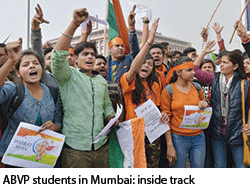 The maharashtra public Universities Bill 2016, which replaces the Maharashtra Universities Act, 1994, was passed unanimously by the state legislative assembly on December 8. The new Act permits holding of student union and council elections which were banned by the 1994 Act. While politically affiliated student organisations have welcomed the new legislation, nervous academics are predicting it will accelerate already falling academic standards.
The maharashtra public Universities Bill 2016, which replaces the Maharashtra Universities Act, 1994, was passed unanimously by the state legislative assembly on December 8. The new Act permits holding of student union and council elections which were banned by the 1994 Act. While politically affiliated student organisations have welcomed the new legislation, nervous academics are predicting it will accelerate already falling academic standards.
Reintroduction of elections in colleges and universities has been a long-standing demand of student unions in the state, most of whom are affiliated with political parties. Currently, student leaders of the Yuva Sena, the student wing of the Shiv Sena and Maharashtra Navnirman Vidyarthi Sena (MNVS) of the Maharashtra Navnirman Sena led by Shiv Sena chief Uddhav Thackeray’s estranged cousin Raj Thackeray, are on Mumbai University’s council. However, it is the Akhil Bharatiya Vidyarthi Parishad (ABVP), the student wing of the right-wing Rashtriya Swayamsevak Sangh (RSS) — the ideological parent of Maharashtra’s ruling BJP — which is likely to benefit the most since the state’s current higher and technical education minister Vinod Tawde was a former ABVP leader.
Aniket Ovhal, a ABVP member, says the new legislation will ensure that students have a greater say in the administration of Maharashtra’s higher education institutions. “In colleges where student unions are active, the management is always under pressure to resolve students’ grievances at the earliest. Since 1994, even basic demands such as reduction in tuition fees, grant of scholarships, proper evaluation of answer sheets etc were ignored. This will change now.”
However, given the violent history of student politics and the politicisation of higher education institutions — last February sedition charges filed against Jawaharlal Nehru University (JNU) students’ union president, Kanhaiya Kumar, and a month earlier the suicide of Ph D student, Rohit Vemula inside the University of Hyderabad became highly politicised national issues — college principals, vice chancellors and faculty forecast turmoil in college and university campuses as ABVP, Yuva Sena, MNVS and Left student unions compete for dominance.
“Already the quality of school-leavers entering colleges is declining, thanks to regressive policies such as no-detention until class VIII and making the class X exam optional. Therefore why create an environment that will distract students from academics?” asks A.C. Vanjani, principal of Mumbai’s MMK College.
In 2005, following a Supreme Court order, the Union ministry of human resource development had constituted a committee under former election commissioner J.M. Lyngdoh to make recommendations on student elections. The Lyngdoh Committee recommended disassociation of student candidates from political parties, faculty-assisted elections, use of handmade posters etc. But despite a 2006 Supreme Court directive to all colleges and universities endorsing the Lyngdoh Committee’s recommendations, political parties continued to clandestinely support their members to college councils while expenditure restrictions imposed by the committee were openly flouted.
Mrudul Nile, associate professor of political science and former director of students’ welfare (2000-08) at Mumbai University and a proponent of student elections, agrees that eliminating muscle and money power in student elections is a difficult proposition. “Student union and council elections prepare students for public life by enabling them to acquire political socialisation and campaigning skills. Unfortunately, though every candidate will claim autonomy from political parties, the association cannot be wished away. We live in a transitional society where some institutions will overlap. We can only urge political parties not to replicate real life politics on the nation’s campuses,” says Nile.
But with political parties actively recruiting and grooming youth leaders who will do their bidding in students councils, it is somewhat naive to request their leaders to exercise restraint. To that extent the new Maharashtra Public Universities Act acknowledges an existing reality.
Besides it gives the ruling party’s favoured ABVP an inside track in the race to acquire power and influence within Maharashtra’s higher education institutions.
Dipta Joshi (Mumbai)